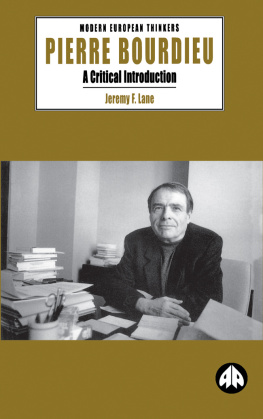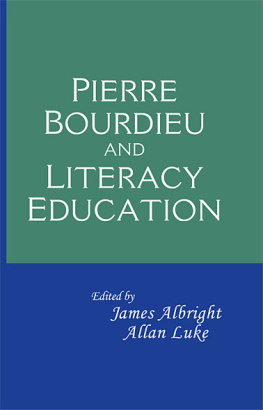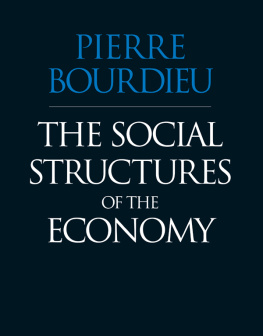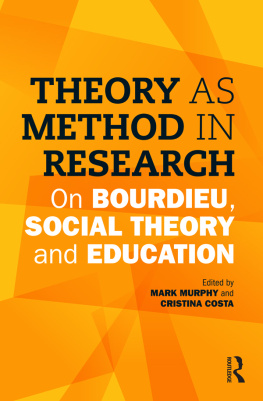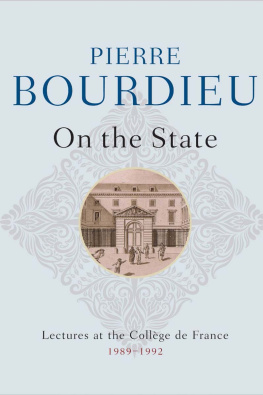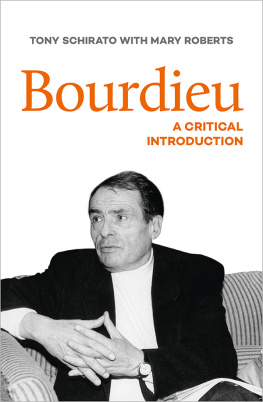Jeremy F. Lane - Pierre Bourdieu: A Critical Introduction
Here you can read online Jeremy F. Lane - Pierre Bourdieu: A Critical Introduction full text of the book (entire story) in english for free. Download pdf and epub, get meaning, cover and reviews about this ebook. year: 2000, publisher: Pluto Press, genre: Science. Description of the work, (preface) as well as reviews are available. Best literature library LitArk.com created for fans of good reading and offers a wide selection of genres:
Romance novel
Science fiction
Adventure
Detective
Science
History
Home and family
Prose
Art
Politics
Computer
Non-fiction
Religion
Business
Children
Humor
Choose a favorite category and find really read worthwhile books. Enjoy immersion in the world of imagination, feel the emotions of the characters or learn something new for yourself, make an fascinating discovery.
- Book:Pierre Bourdieu: A Critical Introduction
- Author:
- Publisher:Pluto Press
- Genre:
- Year:2000
- Rating:4 / 5
- Favourites:Add to favourites
- Your mark:
- 80
- 1
- 2
- 3
- 4
- 5
Pierre Bourdieu: A Critical Introduction: summary, description and annotation
We offer to read an annotation, description, summary or preface (depends on what the author of the book "Pierre Bourdieu: A Critical Introduction" wrote himself). If you haven't found the necessary information about the book — write in the comments, we will try to find it.
Pierre Bourdieu: A Critical Introduction — read online for free the complete book (whole text) full work
Below is the text of the book, divided by pages. System saving the place of the last page read, allows you to conveniently read the book "Pierre Bourdieu: A Critical Introduction" online for free, without having to search again every time where you left off. Put a bookmark, and you can go to the page where you finished reading at any time.
Font size:
Interval:
Bookmark:

Pierre Bourdieu
Modern European Thinkers
Series Editor: Professor Keith Reader,
University of Newcastle upon Tyne
The Modern European Thinkers series offers low-priced introductions for students and other readers to the ideas and work of key cultural and political thinkers of the post-war era.
Jean Baudrillard
Mike Gane
Edgar Morin
Myron Kofman
Walter Benjamin
Esther Leslie
Andr Gorz
Conrad Lodziak and Jeremy Tatman
Gilles Deleuze
John Marks
Guy Hocquenghem
Bill Marshall
George Bataille
Benjamin Noys
Rgis Debray
Keith Reader
Julia Kristeva
Anne-Marie Smith
Pierre Bourdieu
A Critical Introduction
Jeremy F. Lane

First published 2000 by Pluto Press
345 Archway Road, London N6 5AA
www.plutobooks.com
Copyright Jeremy F. Lane 2000
The right of Jeremy F. Lane to be identified as the author of this work has been asserted by him in accordance with the Copyright, Designs and Patents Act 1988.
British Library Cataloguing in Publication Data
A catalogue record for this book is available from the British Library
ISBN 978 0 7453 1501 0 Paperback
ISBN 978 1 7837 1884 9 PDF eBook
ISBN 978 1 7837 1860 3 ePub eBook
ISBN 978 1 7837 1861 0 Kindle eBook
Library of Congress Cataloging in Publication Data applied for
Designed and produced for Pluto Press by Chase Production Services
Typeset from disk by Stanford DTP Services, Northampton
Printed on Demand in the European Union by CPI Antony Rowe,
Chippenham and Eastbourne, England
Contents
For Ben Taylor, who first encouraged me
to think about French culture.
Acknowledgements
The PhD thesis on which this study is based was born of a snap decision to abandon a lucrative job at a London radio station, move to Glasgow and become a student once again. Pierre Bourdieu notes somewhere that those who have a decent stock of inherited cultural and economic capital can easily afford to make the most apparently risky career moves and this was no doubt true in my case. Nonetheless, the social and psychological risks involved in such a move could have been real enough, had it not been for the constant support of friends, family and colleagues in London and the immense warmth of my reception in the marvellous city of Glasgow. The individuals concerned are too numerous to be mentioned here by name, but they know who they are and without their support this project would never have come to fruition.
First amongst those who made a more tangible contribution to the completion of this study is my thesis supervisor, Professor Sian Reynolds, without whose acute mind, encyclopedic knowledge of French history and society, and unfailing good humour my work on Bourdieu would not have progressed far. Of the many other individuals who contributed their time, advice and encouragement, I should also like to thank Jon Beasley-Murray, Pierre Bourdieu, Peter Collier, Martyn Cornick, Jill Forbes, Michael Kelly, Bill Kidd, Bill Marshall, Martin McQuillan, Robin Purves, Graeme MacDonald, Graham Roberts, Stephen Thomson and all my colleagues in the French Departments at the Universities of Stirling and Aberdeen. The Faculty Research Committee of the University of Aberdeen offered much appreciated financial help in covering copyright expenses. The editorial board of Modern and Contemporary France kindly agreed to my reproducing, in , a modified version of an article, Domestiquer lexotique, exotiser le domestique: the symbiosis of ethnology and sociology in the work of Pierre Bourdieu, that first appeared in their journal in 1997, vol. 5, no. 4, pp. 44556.
Introduction
In late August 1998, a photograph of the sociologist and anthropologist Pierre Bourdieu appeared on the front cover of the weekly French news magazine LEvnement du jeudi. Below the photograph was a caption which read: Bourdieu, the most powerful intellectual in France. Inside the magazine, a lengthy dossier discussed the perceived strengths and weaknesses of Bourdieus work.
No doubt Bourdieu himself was less than delighted with this sudden burst of media attention, sparked as it was by the publication of Janine Verds-Lerouxs highly critical study of his work, Le Savant et la politique: essai sur le terrorisme sociologique de Pierre Bourdieu (Politics and the Scholar: an essay on Pierre Bourdieus sociological terrorism) (see Verds-Leroux 1998). Nonetheless, the intense media interest in Bourdieus work did genuinely reflect his current status as one of Frances most high-profile intellectuals, a status gained both through his extensive theoretical output in the domains of sociology and anthropology and his increasingly frequent political interventions in defence of Frances most impoverished and marginalised social groups, the homeless, the unemployed, illegal immigrants, striking workers. Bourdieus name perhaps first began to be associated with these social and political issues in 1993, with the publication of the immense collaborative study of contemporary forms of social exclusion published under his editorship, The Weight of the World (La Misre du monde 1993). The book clearly resonated with a broader sense of political, cultural, and social malaise in France; it sold in large numbers and certain of its passages have been performed as short plays by French theatre groups. Bourdieus public intervention in support of striking students and workers during the French public sector strikes of autumn 1995 raised his political profile still further. It was surely this experience of political engagement which encouraged him to found and edit the Raisons dagir series, a set of pamphlets presenting the most advanced state of research on current political and social problems written by a range of authors all animated by the politically engaged desire to circulate the knowledge indispensable for political reflection and action in a democracy (Halimi 1997, p. 4). Bourdieu has himself published two pamphlets in this series; an analysis of the threat to intellectual and artistic autonomy posed by the media in On Television and the Media (Sur la tlvision 1996), and a series of directly political interventions, propositions for resisting the neo-liberal invasion, in Acts of Resistance (Contre-feux 1998). Both books have prompted further heated debate and sometimes quite hostile responses in the French media (see Schneidermann 1999).
Bourdieus fame and influence are, however, by no means solely attributable to his recent, more directly political pronouncements in his native France. On the contrary, his work has for many years now exerted a significant influence over the fields of sociology and anthropology throughout the world. His theories of class, culture, and education, elaborated in texts such as The Inheritors (Les Hritiers 1964), Reproduction (La Reproduction 1970), and Distinction (La Distinction 1979), are obligatory points of reference for anyone writing in these areas. His three book-length studies of Kabylia in Algeria, Esquisse dune thorie de la pratique (1972), its much revised and extended English translation, Outline of a Theory of Practice (1977), and The Logic of Practice (Le Sens pratique 1980), have acquired a similar status within the domain of anthropology. The publication in 1992 of Bourdieus detailed study of the structure and genesis of the nineteenth-century French artistic and literary fields,
Font size:
Interval:
Bookmark:
Similar books «Pierre Bourdieu: A Critical Introduction»
Look at similar books to Pierre Bourdieu: A Critical Introduction. We have selected literature similar in name and meaning in the hope of providing readers with more options to find new, interesting, not yet read works.
Discussion, reviews of the book Pierre Bourdieu: A Critical Introduction and just readers' own opinions. Leave your comments, write what you think about the work, its meaning or the main characters. Specify what exactly you liked and what you didn't like, and why you think so.

